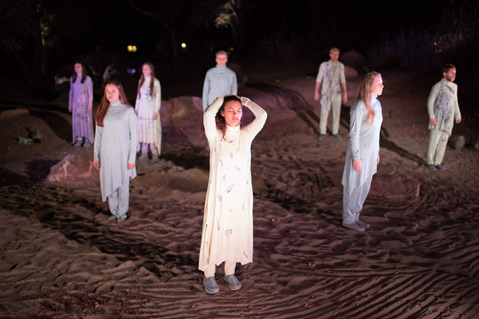Electra Reviewed
Westmont Presents Greek Tragedy Outdoors

The curse on the house of Atreus, a subject ordinarily associated primarily with the Oresteia trilogy of the Greek writer Aeschylus, also received a powerful treatment from Sophocles, the author of Oedipus Rex. In his play Electra, Sophocles tackles the tragic descent of this clan into murderous revenge by focusing on the events that follow the death of Agamemnon, in particular the return of his son Orestes and the murder of his wife and Orestes’ mother, Clytemnestra. In Mitchell Thomas’s mesmerizing new production of Nick Payne’s 21st century English adaptation, the drama’s ritual element is restored without sacrificing any of Sophocles’ psychological acuity. This is ancient Greek tragedy for the present moment, with scenes that are every bit as intense and saturated with inner life as those of a show written yesterday.
The story takes place in the aftermath of the events detailed in Aeschylus’ Agamemnon. The great king, forced to sacrifice his daughter Iphigenia, is in turn murdered by his wife and her lover, Aegisthus. Although Aegisthus is never seen in Sophocles’ Electra, five main characters perform substantial roles, and a chorus responds to the action. The main characters are Clytemnestra (Rebecca Jacks), Electra (Christine Nathanson), her sister Chrysothemis (Lauren White), Orestes (Connor Bush), and Strophius (Chris Wagstaffe). The chorus includes actors Paige Tautz, Ben Offringa, and Chloe Burns along with all the principals.
The play’s main action comes when Orestes and Strophius sneak into the castle under the pretext of presenting Clytemnestra with the ashes of a supposedly dead Orestes. This ruse is designed to get them close enough to the royal pair to kill them in revenge for the murder of Agamemnon. In addition to Nick Payne’s smart, energetic script, the production has several other things going for it, many of which come as this plot begins to be carried out. Sophocles is perhaps the closest thing there is to an inventor of theater as we know it, and the scene in which Orestes must pass by his sister Electra while carrying the urn that contains what are said to be his ashes shows the playwright at the peak of his powers. Orestes crosses in front of the grieving Electra, who asks him if the urn contains the ashes of her brother. She only held him once before he was exiled as a small boy, and she would like to hold the urn so that she might feel his weight again for one last time. It clearly breaks Orestes’ heart to hear this, and he wants to tell her he’s alive even though he knows that he should not. Finally, the temptation becomes too much, and Orestes reveals his identity to Electra. The classic elements identified by Aristotle as central to tragedy are present here in abundance, as recognition and reversal, but also as pity and fear. Fear indeed dominates the finale, as Orestes murders his mother and her lover, leaving the bloody body of Clytemnestra center stage. Wonderful performances throughout, particularly by Connor Bush and Christine Nathanson make this a very memorable evening. In addition, the excellent musical score created by Andrea Fishman, Eric Ederer, Richard Johnson, and Rebecca Shasberger brings a powerful element to the overall effect. In this Electra, the sublimity of 2500 years ago comes back to life.



